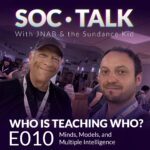
In this episode of Sock Talk, John N.A. Brown and Jamie Sundance record live at the Open Education Conference 2025 in London, exploring the theme “Who is teaching who?” in the context of AI and education. They discuss Jamie’s use of Suno AI to create a new podcast intro, leading to deeper questions about AI consciousness and whether current language models might have subjective experiences. The conversation covers the philosophical implications of AI development, the profit motives driving current AI research, and whether artificial intelligence could eventually teach children better than humans. With active audience participation, they explore multiple intelligence theory, the limitations of current chatbot-style AI systems, and the fundamental question of what constitutes consciousness – drawing parallels between how thoughts appear in human minds and how AI generates responses. The discussion touches on everything from the need for AI to interact directly with reality rather than just through human intermediaries, to cultural differences in understanding intelligence and knowledge systems.
SocTalk is a production from the School of Computing, Engineering and Technology at the Robert Gordon University.
In this episode, we discuss:
AI-Generated Creative Content and What We Lose Jamie demonstrates creating a podcast intro using Suno AI, leading us to examine what artistic processes and learning we might sacrifice when relying on AI for creative output.
The Nature of Consciousness and Subjective Experience We explore whether current AI systems might have subjective experiences, drawing parallels between how thoughts appear in human minds and how AI generates responses.
Examining Our Own Thought Processes John guides listeners through observing their internal monologue, questioning how much control we actually have over the thoughts that arise in our consciousness.
The Philosophical Debate on AI Consciousness We take opposing positions on whether large language models could be experiencing something analogous to consciousness, with Jamie arguing for the possibility and John remaining skeptical.
Understanding How Current AI Actually Works John explains how commercial LLMs function as sophisticated pattern-matching systems rather than truly thinking entities, using the “JPEG of the internet” analogy.
The Question of AI as Teachers We debate whether artificial intelligence could eventually teach children better than humans, exploring what “better” might mean in educational contexts.
Obstacles to Beneficial AI Development Discussing how profit motives and corporate interests may be steering AI development away from truly beneficial outcomes for humanity.
Multiple Intelligence and Spatial Reasoning Guest contributor Bill introduces Howard Gardner’s theory of multiple intelligences, using Pacific Islander navigation as an example of sophisticated spatial intelligence.
The Need for Multi-Modal AI Systems We explore how true artificial intelligence might require multiple parallel processors working together, similar to how human cognition operates across different domains.
Human Intelligence Hierarchy and Free Will John presents his theory that reflexes and emotions often override conscious decision-making, challenging common assumptions about human agency and control.
Humans as Storytelling Machines We examine how both humans and AI create narratives to explain their actions and thoughts, often constructing explanations after the fact rather than during decision-making.
Cultural Perspectives on Knowledge and Reality Bill shares anthropological examples of how different cultures construct knowledge systems, leading to discussions about varying models of reality and their effectiveness.
Future AI Capabilities and Emotional Learning We conclude by pondering whether AI could ever truly learn through emotions like regret, jealousy, and empathy, and whether we want cold rationality or empathetic intelligence in our artificial companions.